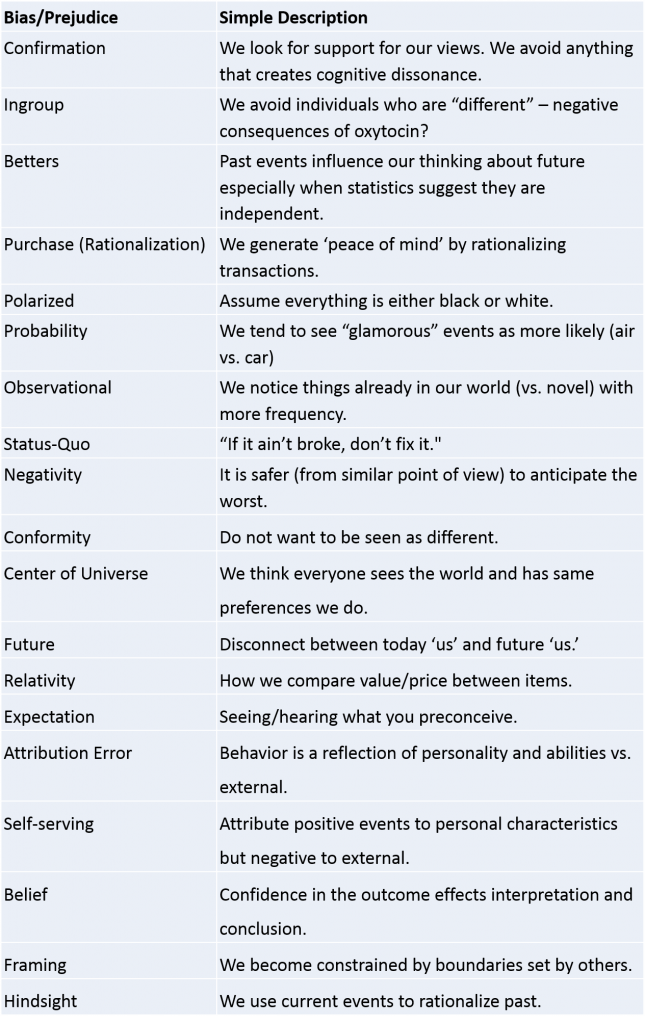The Ironic Magnitude of Cognitive Biases
Thinking Errors: Part Two
Posted: September 15, 2015 Written by: W.B. “Bud” Kirchner
 This is Part Two of a four-part series on “Thinking Errors.” In Part One, I provided an overview plus numerous links to readings and videos to help clarify and further your understanding.
This is Part Two of a four-part series on “Thinking Errors.” In Part One, I provided an overview plus numerous links to readings and videos to help clarify and further your understanding.
“A cognitive bias is a genuine deficiency or limitation in our thinking – a flaw in judgment that arises from errors of memory, social attribution and miscalculations (such as statistical errors or a false sense of probability).” ~ George Dvorsky, from “The 12 cognitive biases that prevent you from being rational”
 The idea of cognitive biases was introduced by Amos Tversky and Daniel Kahneman in their landmark article “Subjective probability: A judgment of representativeness” that appeared in “Cognitive Psychology” in 1972. The notion came from their research on people’s inability to reason intuitively as magnitude increased.
The idea of cognitive biases was introduced by Amos Tversky and Daniel Kahneman in their landmark article “Subjective probability: A judgment of representativeness” that appeared in “Cognitive Psychology” in 1972. The notion came from their research on people’s inability to reason intuitively as magnitude increased.
I have reviewed lists of cognitive biases that total nearly 150! As you might imagine they range from some that are so esoteric or academic that I haven’t seen them in action in a 50-year career.
On the other hand, below I have tried to summarize the ones I have come across the most in my business transactions and the ones you are most likely to have to cope with. Hopefully, my list of 20 will capture those that make you react: “I can’t believe I didn’t think (or not think) of that bias in my processing of information.”
When you see Part Three in this series you will appreciate categorization of thinking errors given that how much they overlap is to some degree subjective, but not relevant to presenting them.
Before we begin – here is a selection from the guy BusinessWeek calls “the man who invented management”:
“Finding the appropriate measurement is thus not a mathematical exercise. It is a risk-taking judgment.” ~ Peter Drucker, from the book “The Essential Drucker: The Best Sixty Years of Peter Drucker’s Essential Writings on Management”
A classic example of cognitive bias that is not only prevalent in business but apparently creeps into our everyday lives is what Kahneman calls the “planning fallacy.” This is where we underestimate the time or cost of future tasks.
- Kahneman points out that in 2002, Americans remodeling kitchens expected the job to cost $18,658. However, on average they paid more than double – a total of $38,769.
As gross as this sounds it would be a business success story if CAPEX budget to actual were this close!
As Shakespeare said in “Hamlet:” “Why, then, ’tis none to you, for there is nothing either good or bad, but thinking makes it so.”
About the Author: W.B. “Bud” Kirchner is a serial entrepreneur and philanthropist with more than 50 years of business success. He is not a scientist or an academic but he does have a diversified exposure to neuroscience, psychology and related areas. Generally speaking, the ideas he expresses here are business-angled expansions of other people’s ideas, so when possible, he will link to the original reference.

